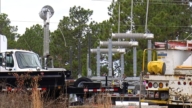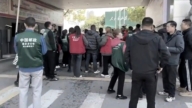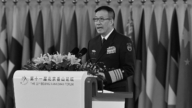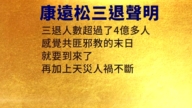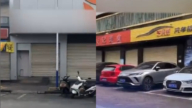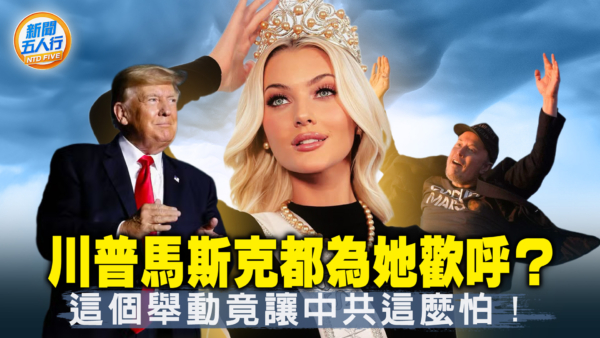【新唐人2011年8月11日讯】 继海南文昌毛泽东像被砸毁之后,河南方城县近日也有座毛纪念馆面临强拆。连村民家中自设的毛像也被推倒,当局指纪念馆是违法占地。而村民则质疑当局“闻毛色变”才借词清拆。对于毛像这次遭当局强拆,当局的动向如何?下面请一起听一听学者对此事的分析。
上个月20号,河南省方城县券桥乡土山村,中共第一党魁“毛泽东纪念馆”,收到了限期拆除的行政处罚决定。
土山村,位于方城县城南5公里,因村子北靠一座孤零零的荒土岗而得名。毛纪念馆是2005年由土山村党支部委员徐保卿等人带动,自发修建起来的。就建在村外这座名为“土山”的荒岗之上。
2009年4月11号上午,在毛纪念馆原计划开馆之日,几辆警车、几十名员警及当局官员将小小“土山”团团围住,纪念馆已经挂上的匾额被强行摘除,墙壁被贴上“严禁靠近、禁止入内”的警示标语。
《北京之春》杂志主编胡平认为,河南当局把毛像拆掉,它不仅仅是一个建筑上问题,它表明当局对所谓毛的纪念,还是有些忌讳。
胡平(《北京之春》杂志主编):一方面它(中共当局)又不肯丢掉毛这个牌子,因为它怕由此引起这个对它们整个共产党政权合法性的质疑。但另一方面它们显然也知道,由于毛犯下太多的罪恶。所以从各种角度他们就采取一种很矛盾的这么一种做法。就是在表面上呢,依然维护毛这个招牌,但在实际上呢采取些措施去削弱毛的影响。”
前不久,重庆市委书记薄熙来大搞唱红打黑声势,走毛泽东那一套模式,提倡百姓戴毛像章,引来了重大非议和批判。
胡平表示,中共当局中南海那些人,对薄熙来在重庆搞唱红打黑,相当忌讳;对那些毛左们大声疾呼要恢复毛那一套,也不满意。但是他们也需要这个招牌。
胡平:“像薄熙来他们想利用毛的招牌做事,这种做法(中南海的人)肯定也是相当反感,只不过它们(中南海的人)又不能像打击所谓自由化那样直接去出手打击,所以就往往采取一些间接的办法,以拆迁哪,以一种,总之以其它的名义去对这种势头呢又加以压制。”
另外,据北京知名作家铁流表示,悬挂在天安门城楼毛泽东的头像常遭老百姓涂污。中国老百姓如此仇恨毛泽东,是因为他主政27年干下太多的坏事、恶事,“大跃进”、“大炼钢铁”,活活饿死近四千多万中国人。“十年浩劫”让中国陷入“无产阶级文化大革命”。一桩桩一件件令人发指。
大陆媒体报导,这几年,各地都有清除毛像的意识。海南文昌一尊高近10米的毛泽东玉石雕像,被推倒,断成五截,面目全非。
评论家、自由撰稿人温克坚表示,如果中国土地上全部毛像被强拆了,那么这片土地上也许就再也没有强拆故事了。
独立作家余杰早期曾经表示:“毛像矗立的中国是奴才遍地的中国,是亟需精神启蒙的中国。”
新唐人记者常春、唐睿采访报导。
Mao’s Statues Face Demolitions
After a statue of Mao Zedong was smashed in Hainan,
another Mao’s memorial hall in Fangchen County, Henan,
is facing a forced demolition.
Even Mao’s statues in villagers’ homes were torn down.
Authorities said the memorial hall occupied land illegally,
while villagers questioned the real reason.
They think that Mao is a sensitive topic for the authorities.
On July 20, Mao Zedong Memorial Hall in Tushan Village,
Henan, received an administrative punishment.
It will be dismantled within a timeframe.
Tushan Village is 5 km away from Fangchen County.
It is named after a barren hill nearby.
Mao’s memorial hall was built on the hill in 2005,
by a local party commissioner Xu Baoqin and others.
It was built upon this hill.
Mao’s memorial hall was scheduled
to open to the public on April 11.
On that very day, dozens of policemen and local officials
besieged this little hill.
Plaques in the memorial hall were taken down and
police warnings of “keep off" were put on the wall.
Hu Ping, chief editor of Beijing Spring magazine believes that
the authorities’ dismantling of Mao’s statue
was not only a construction issue.
It reveals that the authorities have concerns about
commemorating Mao.
Hu Ping: On one hand, the Chinese Communist Party (CCP)
does not want to cast Mao aside.
Because it is afraid that this would arouse questions
on the CCP’s legitimacy.
On the other hand, CCP knows about Mao’s numerous crimes.
So after considering different factors,
they have chosen a very contradictory way.
That is, on the surface, they still maintain Mao as the CCP’s idol,
but in fact they take actions to diminish his influence.
Not long ago, Chongqing Municipal Party Secretary Bo Xilai
promoted “singing red songs" to follow Mao’s method.
He advocated wearing badges of Mao.
Bo has been heavily criticized for these.
Hu said, the CCP leaders in Zhongnanhai had great concerns
on Bo’s"singing red songs" in Chongqing.
They were also not satisfied with the Maoists’ suggestion
to return to Mao’s era. But, they need Mao as their sign.
Hu: Some people like Bo Xilai use Mao to do things.
(CCP leaders in Zhongnanhai) must dislike this practice.
But they cannot attack these people directly.
So the CCP leaders use some indirect methods, including
forced demolitions, to suppress this practice.
In addition, well-known Beijing-based writer Tie Liu said,
the picture of Mao Zedong on the Tiananmen Square
is often smeared by the people.
Chinese people resent Mao so much, for his evil crimes
during his 27 years of rule.
“Great Leap Forward" and others starved almost 40 million
Chinese people to death.
“The ten years of catastrophes" led China to be trapped in
the “Great Proletarian Cultural Revolution."
Mainland media reported that in the recent years, there has
been the consciousness to remove Mao’s images across China.
In Wenchang City, Hainan, a 10-meter statue of Mao was
torn down, broken into five pieces and beyond recognition.
Wen Kejian, a critic and freelance writer, said that
if all Mao’s statues in China are dismantled,
perhaps there will be no more house demolitions in China.
Independent writer Yu Jie had said earlier that
“China with Mao’s statues is a China with slaves everywhere.
This kind of China requires spiritual enlightenment."
NTD reporters Chang Chun, Tang Rui and Wang Mingyu.



